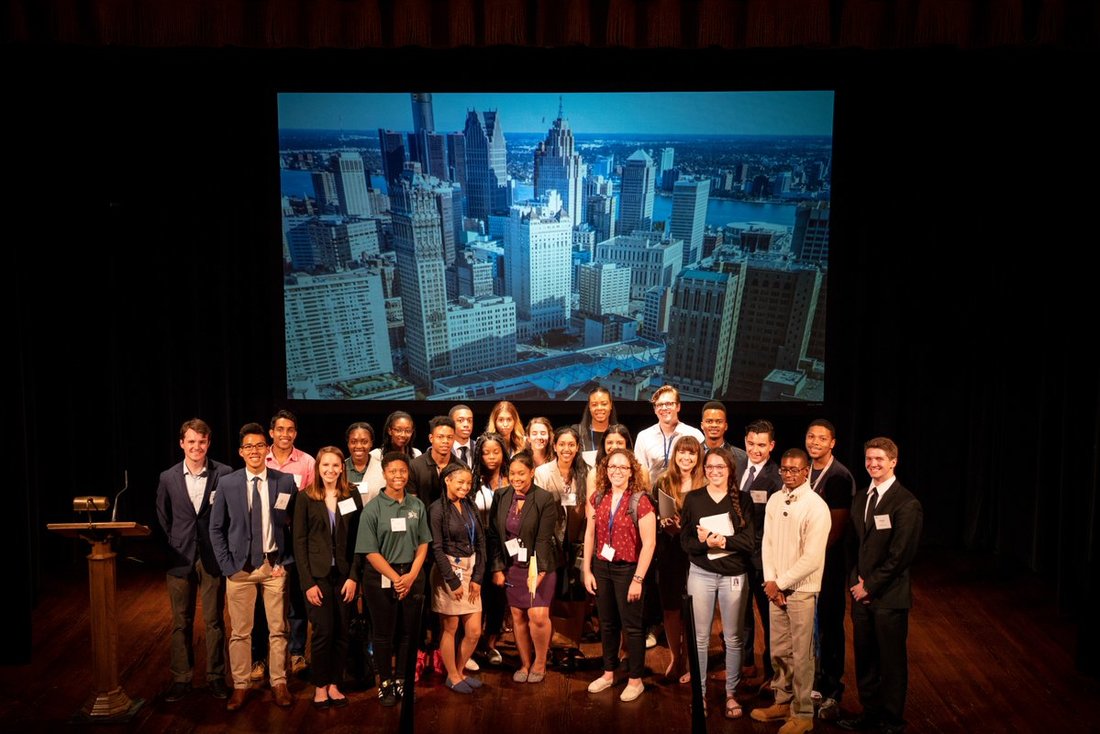The concept of social entrepreneurship was vague and confusing to me before coming to Detroit. I had a generalized understanding of what it meant—entrepreneurs were what people on the TV show, Shark Tank, were and social related to community, so social entrepreneurship must be the creation of new ideas and products that benefit the community.
After spending two weeks in Detroit, I saw several social enterprises in action, allowing me to better comprehend the ways in which private corporations can benefit society. Now, I see social entrepreneurship as placing a greater emphasis on equity as opposed to profit. This is essential in the world that we live in today because so much of our history has been tied to inequality and oppression. The idea of equity is not limited to just private corporations and entrepreneurs. For instance, I learned about a prominent black community in southwest Detroit that was displaced as a result of the construction of a highway. This narrative is all too common in The United States—A similar tragedy occurred in the Hayti neighborhood in Durham. Detroit is now looking to relevel that part of the highway in order to make it more pedestrian and bike-friendly; it is also reconnecting a neighborhood that was once torn apart. While the new boulevard will not restore the community to its historic tradition, it is a step in the direction towards equity.
Releveling a highway requires the cooperation of communities and civic governments, but not necessarily entrepreneurs and start-up companies. Yet, I see a similar emphasis on equity in MoGo, a start-up company with a focus on access for people of all demographics. All too often, bike shares are seen as a mode of transportation used by middle to upper-class millennials, similar to the light-rail lines that have been popping up in cities across the country. Bicycles are an efficient mode of transport that combine speed, exercise, and enjoyment; they are an asset that should be readily available to all. MoGo seeks to consider who “all” includes. This past week, I had the opportunity to help homeless Detroiters sign up for a $5 annual MoGo pass, empowering and equipping them with a new form of mobility. My previous experience with bikeshare included meetings with other companies whose main objective was to maximize profit. MoGo’s access pass does not maximize their profit; I’m sure they lose money off of it because the passes are significantly discounted. Yet the program has a tremendous benefit on the community by assisting a population that is often overlooked.
The spirit of social entrepreneurship is seen throughout the city of Detroit in various forms of start-ups, public/private partnerships, and social enterprises. I’ve observed micro-loan granting competitions, co-workings spaces in an old warehouse, and jewelry made from old graffiti. Each initiative makes an impact on a specific societal dilemma, improving the lives of many Detroiters and the city they call home.
After spending two weeks in Detroit, I saw several social enterprises in action, allowing me to better comprehend the ways in which private corporations can benefit society. Now, I see social entrepreneurship as placing a greater emphasis on equity as opposed to profit. This is essential in the world that we live in today because so much of our history has been tied to inequality and oppression. The idea of equity is not limited to just private corporations and entrepreneurs. For instance, I learned about a prominent black community in southwest Detroit that was displaced as a result of the construction of a highway. This narrative is all too common in The United States—A similar tragedy occurred in the Hayti neighborhood in Durham. Detroit is now looking to relevel that part of the highway in order to make it more pedestrian and bike-friendly; it is also reconnecting a neighborhood that was once torn apart. While the new boulevard will not restore the community to its historic tradition, it is a step in the direction towards equity.
Releveling a highway requires the cooperation of communities and civic governments, but not necessarily entrepreneurs and start-up companies. Yet, I see a similar emphasis on equity in MoGo, a start-up company with a focus on access for people of all demographics. All too often, bike shares are seen as a mode of transportation used by middle to upper-class millennials, similar to the light-rail lines that have been popping up in cities across the country. Bicycles are an efficient mode of transport that combine speed, exercise, and enjoyment; they are an asset that should be readily available to all. MoGo seeks to consider who “all” includes. This past week, I had the opportunity to help homeless Detroiters sign up for a $5 annual MoGo pass, empowering and equipping them with a new form of mobility. My previous experience with bikeshare included meetings with other companies whose main objective was to maximize profit. MoGo’s access pass does not maximize their profit; I’m sure they lose money off of it because the passes are significantly discounted. Yet the program has a tremendous benefit on the community by assisting a population that is often overlooked.
The spirit of social entrepreneurship is seen throughout the city of Detroit in various forms of start-ups, public/private partnerships, and social enterprises. I’ve observed micro-loan granting competitions, co-workings spaces in an old warehouse, and jewelry made from old graffiti. Each initiative makes an impact on a specific societal dilemma, improving the lives of many Detroiters and the city they call home.

 RSS Feed
RSS Feed
